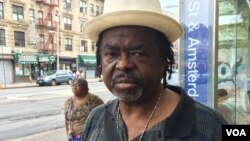It’s been a year since Michael Brown, an African American youth, was killed by police officer Darren Wilson in Ferguson, a suburban St. Louis town in the Midwest of the United States. The incident set off weeks of demonstrations and some violence by African Americans and others in Ferguson and other American cities, including New York. Protesters said police routinely target blacks, and often brutalize them. There was more unrest when a grand jury declined to charge Wilson with a crime.
Some progress, but not enough
One year later, when asked if relations between police and minority communities have improved, New York’s Harlem residents have mixed responses.
“Well, there have been some appeasing moves to sort of ease down the racial friction, but it is my belief you can’t change what’s in a man’s heart," said Buddy Barrett. "I don’t know if that’s going to happen."
Barrett is an older African American man who was waiting for a bus on 125th Street, Harlem’s main commercial thoroughfare. “But I know we can’t continue on the course we’re on. Police have got to stop killing young black men. We’re mad as hell we’re not going to take it anymore!”
All lives matter
A woman who only identified herself as “Donnel” is also angry about the killing of young black men. She says police continue to treat black lives as less precious than their own.
“It ain’t going to get no better as long as the police department feel[s] that if you’re not a cop, your life don’t mean [expletive],” Donnel said. “And that’s how they want society to feel. Like when one of them dies they want the whole world [to] stop and moan. I’m not doing that. You are not doing that for a regular citizen, why should we do it for you?”
One criticism of current police practice is that those who patrol the local streets are psychologically far too removed from the communities they serve. Indeed, many New York police officers live outside the city itself. Donnel says this “fortress mentality” contrasts with how it was during her girlhood in 1960s.
“I remember back in the day, you knew who your neighborhood cop was. We had a problem, we went to him. He knew us. He knew the neighbors. He knew our names,” she recalled. “These cops is not trying to get familiar and what they need to start doing - like they said they were gonna do - wherever they work, they need to live there. Let them live around where they work at. I bet you it would change then.”
Change your mind, change the world
Hamed and Kenngie have been married for 27 years and have seven children. They say there is a lot of work to do for all concerned.
“I believe people have to change in order for the situation to change,” said Hamed. “You can put all sorts of things in place. You can chastise the police. You can put services in the community. You can talk and have all the community meetings you want. However, if you don’t change the way people think, then the problem is still going to exist.”
He believes the crisis in Ferguson was created by both the community and the police.
“You have to speak with youth about respect. Parents have to do their job and be parents," he said. "And at the same time, the police have to understand they are not just in the community to enforce the law, but to communicate. To lead as well as to enforce when you have to. But if it stays separate - the police says, ‘I am here to enforce,’ and ‘the community says ‘I don’t care nothing about you,’ then it’s going to quiet down until the next incident.”
Kenggie agrees with her husband.
“Let me tell you about youth,” she said. Everything starts at home. With respect. With loyalty. With dignity. And if you don’t teach them that at home they are going to bring chaos into the street.”
Kenggie acknowledges the history of racism in the U.S.
“But people have to start taking responsibility for what their downfalls [are] and what they can contribute to the situation,” she said.
Like it or not, we’re all in this together
Nearby, under the marquee of a now-defunct movie theater, Raymond Williams agrees, but with a twist. He says that in a fundamental sense, police and community members, white and black are connected. In his opinion, that is both the bad news and the good new
“They only way we are gonna survive is if we come together as people, as Americans," said Williams. "I don’t care about religions or race. We are human beings and we got to come together as human beings in order to change the situation. We can’t just say that’s a black problem, it’s a white problem. It’s a human problem. ”





